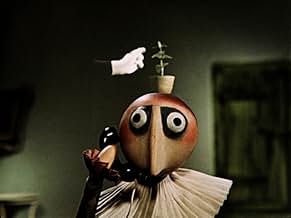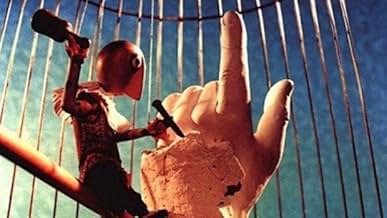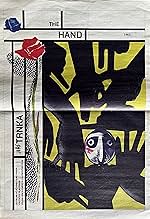IMDb RATING
7.9/10
2.2K
YOUR RATING
A delicate and secluded ceramist sees his orderly life turn upside down, when a gigantic hand in a white glove invades his space, demanding that a sculpture of itself is made. When will the ... Read allA delicate and secluded ceramist sees his orderly life turn upside down, when a gigantic hand in a white glove invades his space, demanding that a sculpture of itself is made. When will the hand's obstinate demands stop?A delicate and secluded ceramist sees his orderly life turn upside down, when a gigantic hand in a white glove invades his space, demanding that a sculpture of itself is made. When will the hand's obstinate demands stop?
- Director
- Writer
- Nominated for 1 BAFTA Award
- 1 nomination total
Featured reviews
The Czechs have long been famed for their animation, its deceptive cuteness making them palatable to most Westerners who will discern in them a critique of life under totalitarianism, although the staff at Disney doubtless found Uncle Walt just as intrusive a backseat driver.
In his final film Jiri Trnka plainly had plenty of baggage to get off his chest. The symbolism in employing a hand is vividly conveyed as it offers the frustrated hero a variety of blandishments - naturally including a television set - as it switches from fussily overbearing to seductive, complete with garter belts and nail varnish.
In his final film Jiri Trnka plainly had plenty of baggage to get off his chest. The symbolism in employing a hand is vividly conveyed as it offers the frustrated hero a variety of blandishments - naturally including a television set - as it switches from fussily overbearing to seductive, complete with garter belts and nail varnish.
'The Hand (1965)' is a Czech new-wave stop-motion short by Jirí Trnka. It tells the tale of a harlequin sculptor who wants nothing more than to take care of his houseplant and create his art (it seems to be a bowl of some sort). In comes a giant hand demanding the sculptor make a statue in its image, and thus the conflict of the picture begins. The thing can easily be read as an allegory for the communism that the Czech Republic (formerly Czechoslovakia) found itself stifled by in the mid-to-late 20th century. The hand is an oppressive force that wants to make the sculptor conform to his wishes; it utilises a number of techniques, some more underhanded than others, to achieve this goal. Unsurprisingly, this leads to nothing other than tragedy. The sculptor will not allow himself to be controlled, so he fights back at every opportunity he gets. However, his fight ultimately feels a little futile because he's trapped no matter which way you look at it (the choice to have his house be surrounded by a void, almost as if it's the set of this film itself, compounds this). Technically speaking, this short is incredible. The animation is wonderfully fluid and instils a real sense of character to its simple protagonist despite his limitations (he doesn't blink, for example). The escalating interactions between the sculptor and the hand are also surprisingly believable. Plus, there are several visually inspired sequences, such as a 'thought bubble' phone conversation, and a generally engrossing atmosphere. It's a really engaging, entertaining and, ultimately, quietly affecting short film. 8/10.
10EdgarST
Jiøí Trnka made his last animated short an indictment of totalitarism, which caused him trouble in his native Czechoslovakia. The elements are few, the symbolisms simple, and his trademark ornaments almost absent here, allowing the viewer to concentrate on the fable. A man in his room dedicates to pottery and to take care of his only plant. But suddenly a huge hand enters the room and orders him to make a statue of itself. The man refuses and he's persecuted by the ominous gloved hand. In these days, where the impression of reality factor seems to be erased from most animations that try to replace the real world, it is refreshing to watch a film, which makes its technique part of the enjoyment.
An absolutely brilliant film! Jiri Trnka, the master of puppet animation, confronts totalitarianism in this, his final, film. It would be banned by the Communist Czechoslovakian government (at the time), despite taking the country's highest animation award.
In this dark and entertaining short film, an artist attempts to create a new pot for his favourite plant. He happily makes his creations while dreaming that his plant will grow to be a beautiful rose. All of a sudden, he here's a knock at the door, and in comes this giant omnipotent hand, that tries to force the artist to make statues in it's likeness. The artist resists as best he can, but he eventually becomes overwhelmed by the constant attempts, by the hand, to force him to conform. He becomes brainwashed; an intellectual zombie. At this point the hand attaches strings to the artist, puts him in a cage, and uses him to make hand statues. All the while glorifying the artist's work and awarding him with medals and honours.
The artist's inner lust to be able to express himself freely is what helps him prevail over his indoctrination, and enables him escape his prison, whether it be literal or in his mind, and return to his home where he now must live in constant fear of the wrath of the omnipotent hand. He shuts himself in, thinking he is out of the reach of the almighty hand, but in the process he puts his plant and pot up high, hoping it is out of the reach of the hand, only to have it fall on his head and kill him. The artist is inevitably destroyed by his own creation. All because of the constant fear he had to live with once he escaped the hand's strings. Once dead, the hand paints the artist as a great person, a national hero. Unfortunately not in the circumstances or for the reasons that the artist would like to be remembered.
Trnka's condemnation of Totalitarian society, and their lack of right for free expression is dark, damning and an amazingly animated. It is no wonder the government banned it as this is the sort of media that people admire, and would perhaps even listen to. That was obviously not acceptable. An amazing example of an artists civil disobedience and the impact it can have. And still quite relevant today for many parts of the world, from the US to the middle east. A must see and definite 10 out of 10! Talk about going out with a bang!
In this dark and entertaining short film, an artist attempts to create a new pot for his favourite plant. He happily makes his creations while dreaming that his plant will grow to be a beautiful rose. All of a sudden, he here's a knock at the door, and in comes this giant omnipotent hand, that tries to force the artist to make statues in it's likeness. The artist resists as best he can, but he eventually becomes overwhelmed by the constant attempts, by the hand, to force him to conform. He becomes brainwashed; an intellectual zombie. At this point the hand attaches strings to the artist, puts him in a cage, and uses him to make hand statues. All the while glorifying the artist's work and awarding him with medals and honours.
The artist's inner lust to be able to express himself freely is what helps him prevail over his indoctrination, and enables him escape his prison, whether it be literal or in his mind, and return to his home where he now must live in constant fear of the wrath of the omnipotent hand. He shuts himself in, thinking he is out of the reach of the almighty hand, but in the process he puts his plant and pot up high, hoping it is out of the reach of the hand, only to have it fall on his head and kill him. The artist is inevitably destroyed by his own creation. All because of the constant fear he had to live with once he escaped the hand's strings. Once dead, the hand paints the artist as a great person, a national hero. Unfortunately not in the circumstances or for the reasons that the artist would like to be remembered.
Trnka's condemnation of Totalitarian society, and their lack of right for free expression is dark, damning and an amazingly animated. It is no wonder the government banned it as this is the sort of media that people admire, and would perhaps even listen to. That was obviously not acceptable. An amazing example of an artists civil disobedience and the impact it can have. And still quite relevant today for many parts of the world, from the US to the middle east. A must see and definite 10 out of 10! Talk about going out with a bang!
a little potter. and his plant. a huge hand. and a statue. one of the most impressive animation. for the simplicity of great art. and for its status of warning. against totalitarian regime. about the resistance against it. about forms of freedom. and its price. so, more than a film. a document. and a testimony. about art as form of free speech in dark ages. this detail does "Ruka " special. a film about fragility. and about its delicate force. as inspired support. for reflection.
Did you know
- Trivia
- Award : Best Animated Film Award at the Oberhausen International Short Film Festival (West Germany, 1966).
- ConnectionsEdited into International Festival of Animation (1977)
Details
Contribute to this page
Suggest an edit or add missing content
















